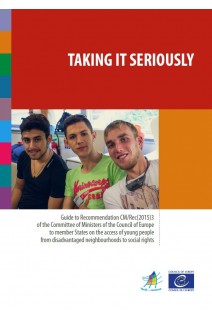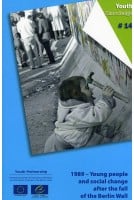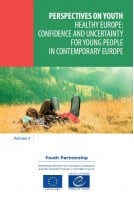



Promoting young people's access to social rights as a means for their inclusion and participation in society!
In and around many cities, social and economic imbalances have led to the development of disadvantaged neighbourhoods, where diversity is also accompanied by poverty and often marginalisation or exclusion. This is sometimes combined with different forms and levels of de facto social segregation, discrimination and violence.
At times of economic and social crisis, feelings of powerlessness and anxiety about the future risk deepening local tensions and underlying conflicts. Young people are often at the centre of these tensions because they are more vulnerable and insecure, and because they are more directly affected by uncertainties regarding the development of their autonomy, as well as participation in society and contribution to its development.
The Council of Europe has challenged itself to respond to these situations by adopting recommendations for its member states that encourage and support them in finding adequate policy responses to situations of exclusion, discrimination and violence affecting young people in disadvantaged neighbourhoods. In early 2015, the Committee of Ministers of the Council of Europe adopted a policy recommendation with proposals for policy measures to member states in order to promote access to social rights for young people.
Proposals concern:
– the provision of accessible, affordable public services;
– overcoming segregation;
– promoting the participation of young people;
– combating discrimination;
– recognition of youth work and non-formal education;
– promoting gender-sensitive approaches to the elaboration of youth policies.
This publication is an accompaniment to this recommendation, and aims to bring its content closer to policy makers, youth work practitioners, youth organisations and youth workers, and provide step-by-step information and guidance on the implementation of the recommendation. The publication also offers advice and examples of actions to take and policies to develop so that the social rights of young people are taken seriously by all the actors concerned by social inclusion and social cohesion.
INTRODUCTION TO THE GUIDE
CHAPTER 1 - THE COUNCIL OF EUROPE AND YOUNG PEOPLE
The Council of Europe and youth policy
The Council of Europe and youth work
CHAPTER 2 - THE COUNCIL OF EUROPE AND THE SOCIAL RIGHTS OF YOUNG PEOPLE
European Convention on Human rights
European Social Charter
Social rights and young people
The Congress of Local and Regional Authorities of the Council of Europe
CHAPTER 3 - THE ENTER! PROJECT ON ACCESS TO SOCIAL RIGHTS FOR YOUNG PEOPLE
Approaches of the Enter! project
CHAPTER 4 - ACCESS TO SOCIAL RIGHTS FOR YOUNG PEOPLE
Access to quality public services
Access to education
Access to health services
Access to social protection
Access to housing
Access to employment
Access to social rights for minority social groups
Promoting sustainable communities
Participative democracy
CHAPTER 5 - INTRODUCTION TO THE ENTER! RECOMMENDATION CM/REC(2015)3
Outline of the recommendation
CHAPTER 6 - MEASURES FOR IMPROVING ACCESS TO SOCIAL RIGHTS
Improving living conditions
Promotion of social inclusion
Promoting participation in the living environment
Non-discrimination and active citizenship
Supporting non-formal education and youth work
Improving gender equality
Preventing violence
CHAPTER 7 - DEVELOPING YOUTH-FRIENDLY PUBLIC POLICIES
What is policy?
How to develop a policy
Development of youth policies
Campaigning
A case study: Giovanisì, Tuscany, Italy
CHAPTER 8 - WHAT YOU(TH) CAN DO: BE ACTIVE AND SPEAK OUT
Understand the situation
Undertake research
Identify the key stakeholders
Start creating your story
Devise a plan of action
Take action
Link up with other groups or movements
Support people in need
Training and peer education
Lobbying and campaigning
APPENDIX
BIBLIOGRAPHY
GLOSSARY
Télécharger un extrait (1000)







Promoting young people's access to social rights as a means for their inclusion and participation in society!
In and around many cities, social and economic imbalances have led to the development of disadvantaged neighbourhoods, where diversity is also accompanied by poverty and often marginalisation or exclusion. This is sometimes combined with different forms and levels of de facto social segregation, discrimination and violence.
At times of economic and social crisis, feelings of powerlessness and anxiety about the future risk deepening local tensions and underlying conflicts. Young people are often at the centre of these tensions because they are more vulnerable and insecure, and because they are more directly affected by uncertainties regarding the development of their autonomy, as well as participation in society and contribution to its development.
The Council of Europe has challenged itself to respond to these situations by adopting recommendations for its member states that encourage and support them in finding adequate policy responses to situations of exclusion, discrimination and violence affecting young people in disadvantaged neighbourhoods. In early 2015, the Committee of Ministers of the Council of Europe adopted a policy recommendation with proposals for policy measures to member states in order to promote access to social rights for young people.
Proposals concern:
– the provision of accessible, affordable public services;
– overcoming segregation;
– promoting the participation of young people;
– combating discrimination;
– recognition of youth work and non-formal education;
– promoting gender-sensitive approaches to the elaboration of youth policies.
This publication is an accompaniment to this recommendation, and aims to bring its content closer to policy makers, youth work practitioners, youth organisations and youth workers, and provide step-by-step information and guidance on the implementation of the recommendation. The publication also offers advice and examples of actions to take and policies to develop so that the social rights of young people are taken seriously by all the actors concerned by social inclusion and social cohesion.
Attention, en vertu de nos conditions générales de vente, l'achat des PDF/epub est réservé aux particuliers.
